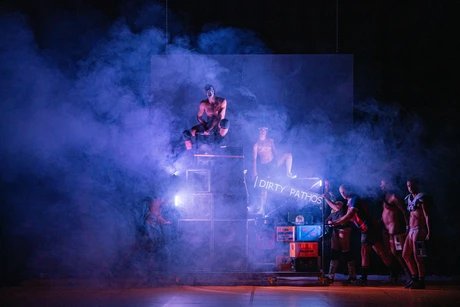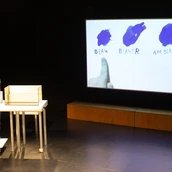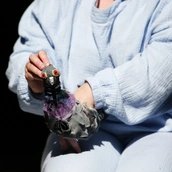
Carolina Bianchi y Cara de Cavalo
Brazilian theater maker and this year's winner of the Silver Lion in Venice, Carolina Bianchi, returns to HAU after two years with the second installment of her sensational trilogy "Cadela Força": "The Brotherhood" addresses male pacts, brotherhoods, and their codes, in which misogyny and sexual violence are deeply inscribed.
Carolina Bianchi is currently considered one of the most uncompromising voices on the international theater scene. After "The Bride and The Goodnight Cinderella," the opening piece of "Cadela Força" (The Strength of the Slut), the Brazilian theater maker now returns to HAU with the second installment of her trilogy on sexual violence against women.
In "The Brotherhood," she and an ensemble consisting entirely of men, alongside herself, dismantle the ideal of brotherhood. Layer by layer, power dynamics are exposed, patriarchal myths are dismantled, and images of masculinity deeply shaped by misogyny and sexual violence are questioned. In doing so, she focuses on where the origins of male power structures lie: in the bonds, rituals, and codes in which patriarchy and misogyny are often subtly inscribed.
But the evening's theater also illuminates how male power dynamics inspire admiration in the context of art history.
In the first act, Bianchi interviews a powerful and famous director. In the second act, a group of male actors takes over the stage, and the work turns out to be a trap: While Bianchi uncovers male power structures, she herself becomes a character who suffers the consequences of her view of this system.
The first part of the "Cadela-Força" trilogy, "The Bride and The Goodnight Cinderella," caused a worldwide sensation. Part two once again prompts audiences to reflect on the role of violence in society and how people contribute to perpetuating it, whether they are aware of it or not.
Since 2015, Carolina Bianchi, who will receive the Silver Lion at this summer's Venice Biennale di Danza, has been working with her São Paulo-based collective Cara de Cavalo (Horse Face) on her very own theatrical language, which oscillates between confrontation, provocation, social analysis, and political relevance. The interdisciplinary group weaves research, theory, pop culture, and art history into hybrid performances. The stage becomes a venue for urgent topics such as femicide, gender-based violence, and patriarchal structures.
Additional information
We do apologize that the following information is currently only available in German.
Participating artists
Carolina Bianchi (Konzept, Text, Regie)
Chico Lima (Mit)
Flow Kountouriotis (Mit)
José Artur (Mit)
Kai Wido Meyer (Mit)
Lucas Delfino (Mit)
Rafael Limongelli (Mit)
Rodrigo Andreolli (Mit)
Tomás Decina (Mit)
Carolina Bianchi (Mit)
Carolina Mendonça (Dramaturgie, Recherche)
Silvia Bottiroli (Dialog über Theorie und Dramaturgie)
Marina Matheus (Übersetzung ins Englische)
Miguel Caldas (Technische Leitung, Sounddesign, Originalmusik)
Murilo Basso (Regieassistenz)
Carolina Bianchi (Bühnenbildkonzept)
Luisa Callegari (Bühnenbildkonzept)
Luisa Callegari (Künstlerische Leitung, Kostüme)
Jo Rios (Lichtdesign)
Montserrat Fonseca Llach (Videos, Projektionen)
Larissa Ballarotti (Live-Kamera, künstlerische Unterstützung)
Jimena Pérez Salerno (Choreografische Aktivierung (Prolog), Bewegungsberatung)
AnaCris (Bühnenmanagement, Produktionsassistenz)



